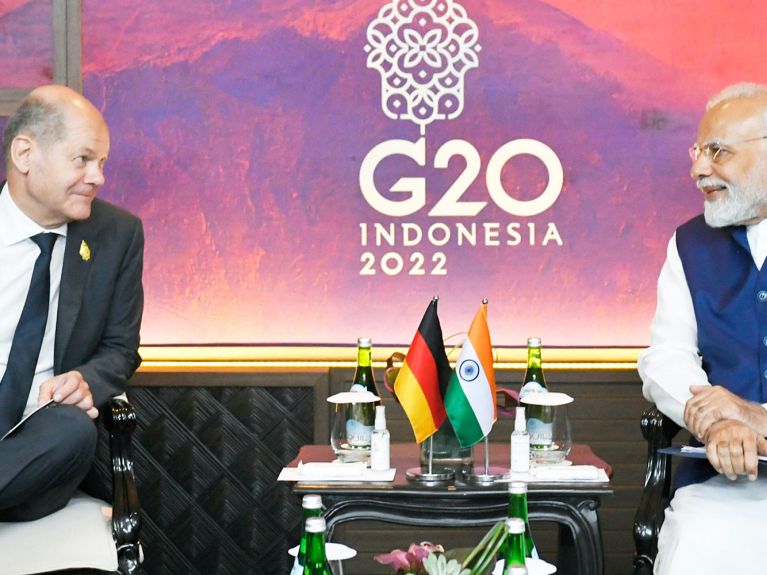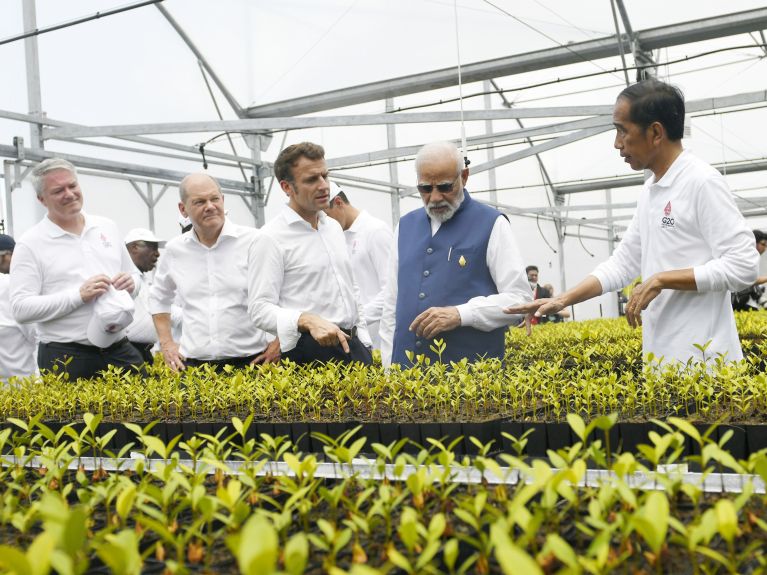Joining forces to protect the climate
The G20 and Indonesia have agreed an energy partnership in which Germany will play an important part.

Seen from the water, the island of Pulau Papan is not much more than just a wooden jetty with a sprawling tropical forest backdrop. But if the specialists at ib vogt, a mid-sized engineering firm in Berlin, are able to turn their vision into reality, this Indonesian island could soon be home to one of the world’s largest solar power plants: “Here, and on the two neighbouring islands, we are planning to install facilities with the capacity to produce almost four gigawatts of solar power,” explains ib-vogt Manager David Ludwig.
He and his team have discovered how much potential this equatorial country has: Indonesia itself, but also its neighbours, need green energy if they are to join the battle against climate change. The electricity from Indonesia could meet around eight per cent of the demand of nearby city-state Singapore with its almost six million inhabitants. The plan is use an underwater cable around 40 kilometres in length to connect the Indonesian islands to the financial hub.
Energy partnership with Indonesia
Global awareness of the topic of energy supply increased in 2022. Admittedly, the year’s political summits were dominated by the war in Ukraine. Almost unnoticed, however, the heads of state and government of the 19 leading industrialised and emerging economies and the European Union (G20) also agreed on the Indonesian island of Bali to cooperate on other major issues.
Dieses YouTube-Video kann in einem neuen Tab abgespielt werden
YouTube öffnenThird party content
We use YouTube to embed content that may collect data about your activity. Please review the details and accept the service to see this content.
Open consent formOne of the agreements offers Indonesia, which hosted the 2022 G20 summit, a new partnership to help it shoulder the burden posed by the fight against climate change. And also to advance large-scale solar projects such as that envisioned by the Berlin-based engineers. They are tendering for a major contract from Singapore: this small island state increasingly wants to use renewable sources to meet its electricity demand – yet the limited space in Singapore means that such facilities have to be located abroad. The Berliners reckon that their project will require a good seven million solar panels – placed side by side, the modules would stretch further than from Berlin to New York. Around 10,000 containers will be needed merely to transport the panels.
A joint battle against climate change
To meet its population’s needs, Indonesia’s economy will have to grow by at least five per cent per year. Such rapid growth will require energy – most of which Indonesia generates using coal. The world’s largest Muslim country burns fossil fuels to cover 92 per cent of its primary energy demand, solar and wind power contributing only a good 2 per cent. On the sidelines of the summit in Bali, Indonesia and the industrialised countries agreed on a Just Energy Transition Partnership (JETP). The signatories now see themselves as partners in the joint battle against climate change.

The energy cooperation agreed in the JETP is embedded within a larger framework: the Partnership for Global Infrastructure and Investment (PGII) was established in the summer of 2021 during the G7 summit in the United Kingdom. Originally it was given the somewhat cumbersome title of Build Back Better World (B3W), but was subsequently renamed PGII. This is where Germany comes into play: it was at the following G7 summit at Schloss Elmau in the Bavarian Alps in 2022 that the decision was taken to reform the partnership just one year later. The summit was hosted by German Chancellor Olaf Scholz.
This JETP is a lighthouse project for multilateral cooperation, energy transition and sustainable investment.
“At the G7 Summit in Elmau, the G7 and international partners pushed forward Just Energy Transition Partnerships. Our progress together with Indonesia is a strong signal that accelerating climate action goes hand in hand with a just transition and economic prosperity. This JETP is a lighthouse project for multilateral cooperation, energy transition and sustainable investment,” Scholz said after the agreement was signed in Bali.
A package of individual projects is designed to reduce greenhouse gas emissions by more than 300 megatons by 2030. The measures are also intended to create new jobs and protect people’s livelihoods. The partners plan to invest 20 billion dollars in the first three to five years.



